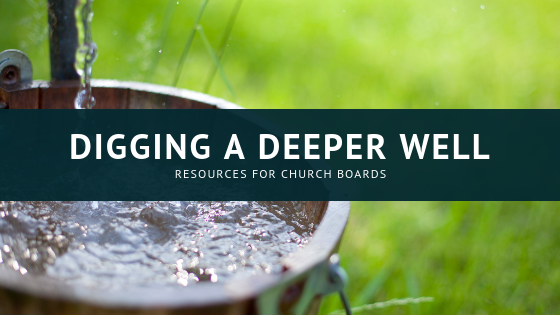At a recent cohort gathering (thank you, Denver) a question arose: “It’s good to dig deeper in church board meetings, but what are the implications for what we do between meetings?”
Practically, if monthly board meetings are going to provide enough time for prayer, Bible study, and discussion of the deeper parts of life together in Christ, some of “the work” will need to get done in between those monthly meetings. A church board acting as a “committee of the whole” and debating the specifics of every recommendation is one sure path to nowhere deep at all.
Here is one counter-cultural suggestion. Distribute meeting materials far enough in advance that board members can be reasonably expected to arrive at the meeting 1) having read all reports and recommendations and 2) having contacted the authors of those reports and recommendations with their questions. Then encourage board members to do both things.
If a board member is given time and clear encouragement to do this in-between work, several good things may flow from it.
First, by contacting the author of the report or sponsor of the recommendation in advance, the board member may be able to get answers to narrow questions that others don’t care about, thus saving the board meeting itself from an endless queue of queries and critiques.
If the board member has a larger concern, contacting the sponsor of the recommendation can only make the whole process stronger—by preparing the sponsor either to refine the recommendation or even substantially rework it prior to the meeting.
Essentially, everything of a transactional nature—everything, that is, that does not merit whole board discussion or demand whole board discernment—should be accomplished “offline.”
Pastors and board moderators can play important roles in the in-between time, by warmly encouraging and curating this sort of cross-committee communication and building trust for healthy board functioning.
But the real work of church boards, during and between their meetings, goes far beyond such communications. That larger purpose is brought to mind in Acts 2:43-47:
43 Awe came upon everyone, because many wonders and signs were being done by the apostles. 44 All who believed were together and had all things in common; 45 they would sell their possessions and goods and distribute the proceeds[ to all, as any had need. 46 Day by day, as they spent much time together in the temple, they broke bread at home[ and ate their food with glad and generous[c] hearts, 47 praising God and having the goodwill of all the people. And day by day the Lord added to their number those who were being saved.
Awe.
Wonder.
Attention to God’s activity.
Sharing in radical and open-hearted ways.
Spending time together.
Praising God.
Cultivating generous hearts and goodwill.
Probably few of us have thought of Acts 2:43-47 as an “agenda” for church board meetings, much less the in-between times. But what if it was? What if this was the prime task of the in-between times?
- How could your board make attention to God’s activity a priority for the in-between times?
- How is there space—or how would you create space—in the board meeting itself for “awe and wonder?”
- What builds capacity for trust among church board members? What have you experienced as eroding trust?
————————————
Note: we will take next week off for Thanksgiving and be back on December 5, 2019








No Comments